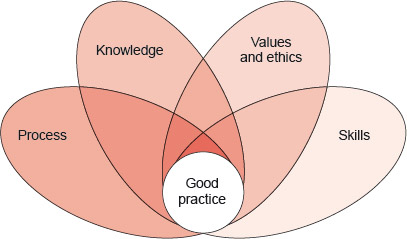1 Key ideas in social work
This section will introduce you to what constitutes good social work practice. You will consider four basic elements of social work, and the values that underpin professional practice. You may be surprised at how much knowledge you already have, and how this can benefit social work practice.
The social work profession promotes social change, problem solving in human relationships and the empowerment and liberation of people to enhance wellbeing. Utilising theories of human behaviour and social systems, social work intervenes at the points where people interact with their environments. Principles of human rights and social justice are fundamental to social work (BASW, 2012).
The model of the four components of good practice shown in Figure 1 acknowledges that learning about social work cannot just be about theoretical knowledge and academic learning, but that it has to be related to the application of this knowledge to the setting where social work is practised, the skills that are used and the value base implicit in direct work with people.
The four components of good practice are:
- knowledge
- values and ethics
- the social work process, including the legal and policy context
- skills.
Your practice and your reflections on what you learn about social work will be guided by your understanding and application of these four components of good practice.

